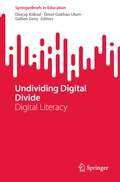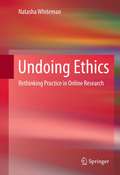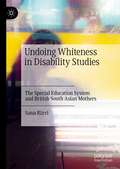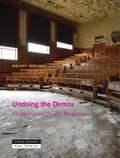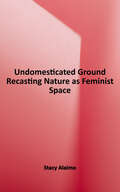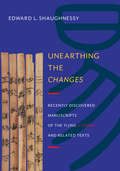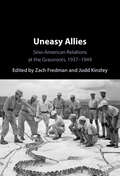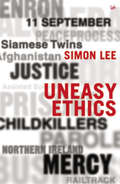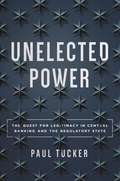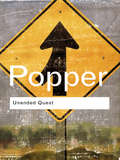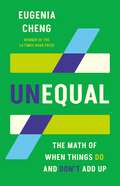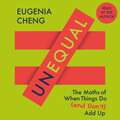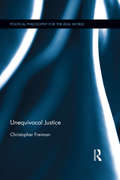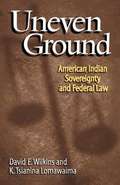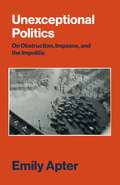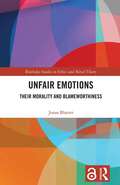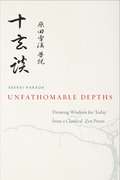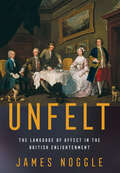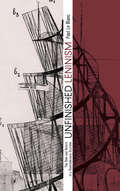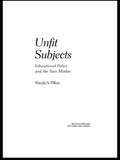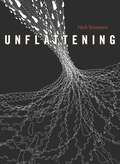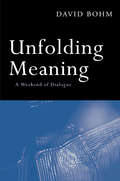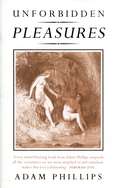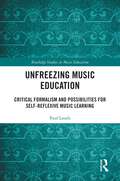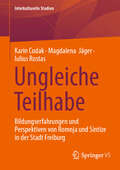- Table View
- List View
Undividing Digital Divide: Digital Literacy (SpringerBriefs in Education)
by Ömer Gökhan Ulum Dinçay Köksal Gülten GençThis book problematizes digital divide with critical lens by focusing on education in general and specifically second language education with an emphasis on the context of Turkey based on sound methodologies and robust theories of modernity, postmodernity, post-structuralism and post-method framework. In line with this conceptualization, critical thinking skills, social dialogue, collaboration, accessibility and digital literacy have been widely discussed empirically and prioritized in this book. In addition, social injustice, digital inequality, gender gap, economic disparity, demographic differences and knowledge divide have also been addressed. EFL teachers and pre-service teachers as cultural workers have been incorporated into the studies to critically reflect upon digital divide in Turkey. The views of teachers and learners at a socio-economic disadvantage emanating from socio-political issues have been addressed and foregrounded. The digital divide and inequalities that COVID-19 pandemic has produced have also been emphasized. The context of Turkey where digital divide has been prevalent during COVID-19 pandemic is believed to inspire researchers specializing in digitalization and digital education. The strategies, problems, effects and solutions have been presented. This book presents a reliable source to students, teachers and academics in education and second language education as well as social scientists and policy-makers across the globe.
Undoing Ethics
by Natasha WhitemanOver the past decade, researchers from different academic disciplines have paid increasing attention to the productivity of online environments. The ethical underpinnings of research in such settings, however, remain contested and often controversial. As traditional debates have been reignited by the need to respond to the particular characteristics of technologically-mediated environments, researchers have entered anew key debates regarding the moral, legal and regulative aspects of research ethics. A growing trend in this work has been towards the promotion of localized and contextualized research ethics - the suggestion that the decisions we make should be informed by the nature of the environments we study and the habits/expectations of participants within them. Despite such moves, the relationship between the empirical, theoretical and methodological aspects of Internet research ethics remains underexplored. Drawing from ongoing sociological research into the practices of media cultures online, this book provides a timely and distinctive response to this need. This book explores the relationship between the production of ethical stances in two different contexts: the ethical manoeuvring of participants within online media-fan communities and the ethical decision-making of the author as Internet researcher, manoeuvring, as it were, in the academic community. In doing so, the book outlines a reflexive framework for exploring research ethics at different levels of analysis; the empirical settings of research; the theoretical perspectives which inform the researcher's objectification of the research settings; and the methodological issues and practical decisions that constitute the activity as research. The analysis of these different levels develops a way of thinking about ethical practice in terms of stabilizing and destabilizing moves within and between research and researched communities. The analysis emphasizes the continuities and discontinuities between both research practice and online media-fan activity, and social activity in on and offline environments.
Undoing Whiteness in Disability Studies: The Special Education System and British South Asian Mothers
by Sana RizviThis book offers a nuanced way to conceptualise South Asian Muslim families’ experiences of disability within the UK. The book adopts an intersectional lens to engage with personal narratives on mothering disabled children, negotiating home-school relationships, and developing familiarity with the complex special education system. The author calls for a re-envisioning of special education and disability studies literature from its currently overwhelmingly White middle-class discourse, to one that espouses multi-ethnic and multi-faith perspectives. The book positions minoritised mothers at the forefront of the home-school relationship, who navigate the UK special education system amidst intersecting social inequalities. The author proposes that schools and both formal and informal institutions reformulate their roles in facilitating true inclusion for minoritised disabled families at an epistemic and systemic level.
Undoing the Demos, First Edition: Neoliberalism's Stealth Revolution (Zone / Near Futures Ser.)
by Wendy Brown<P>Wendy Brown explains how and why neoliberal reason undoes democracy - the political form and political imaginary it falsely promises to secure and reinvigorate. <P>Through meticulous analyses of neoliberalism law, political practices, governance, and education, she charts what has become the new common sense, arguing that for democracy to have a future, it must become an object of struggle and rethinking.
Undomesticated Ground: Recasting Nature As Feminist Space
by Stacy AlaimoFrom "Mother Earth" to "Mother Nature," women have for centuries been associated with nature. Feminists, troubled by the way in which such representations show women controlled by powerful natural forces and confined to domestic space, have sought to distance themselves from nature. In Undomesticated Ground, Stacy Alaimo issues a bold call to reclaim nature as a feminist space. Her analysis of a remarkable range of feminist writings-as well as of popular journalism, visual arts, television, and film-powerfully demonstrates that nature has been and continues to be an essential concept for feminist theory and practice. Alaimo urges feminist theorists to rethink the concept of nature by probing the vastly different meanings that it carries. She discusses its significance for Americans engaged in social and political struggles from, for example, the "Indian Wars" of the early nineteenth century, to the birth control movement in the 1920s, to contemporary battles against racism and heterosexism. Reading works by Catherine Sedgwick, Mary Austin, Emma Goldman, Nella Larson, Donna Haraway, Toni Morrison, and others, Alaimo finds that some of these writers strategically invoke nature for feminist purposes while others cast nature as a postmodern agent of resistance in the service of both environmentalism and the women's movement. By examining the importance of nature within literary and political texts, this book greatly expands the parameters of the nature writing genre and establishes nature as a crucial site for the cultural work of feminism.
Unearthing the Changes: Recently Discovered Manuscripts of the Yi Jing (I Ching) and Related Texts (Translations from the Asian Classics)
by Edward L. ShaughnessyIn recent years, three ancient manuscripts relating to the Yi jing (I Ching), or Classic of Changes, have been discovered. The earliest—the Shanghai Museum Zhou Yi—dates to about 300 B.C.E. and shows evidence of the text's original circulation. The Guicang, or Returning to Be Stored, reflects another ancient Chinese divination tradition based on hexagrams similar to those of the Yi jing. In 1993, two manuscripts were found in a third-century B.C.E. tomb at Wangjiatai that contain almost exact parallels to the Guicang's early quotations, supplying new information on the performance of early Chinese divination. Finally, the Fuyang Zhou Yi was excavated from the tomb of Xia Hou Zao, lord of Ruyin, who died in 165 B.C.E. Each line of this classic is followed by one or more generic prognostications similar to phrases found in the Yi jing, indicating exciting new ways the text was produced and used in the interpretation of divinations. Unearthing the Changes details the discovery and significance of the Shanghai Museum Zhou Yi, the Wangjiatai Guicang, and the Fuyang Zhou Yi, including full translations of the texts and additional evidence constructing a new narrative of the Yi jing's writing and transmission in the first millennium B.C.E. An introduction situates the role of archaeology in the modern attempt to understand the Classic of Changes. By showing how the text emerged out of a popular tradition of divination, these newly unearthed manuscripts reveal an important religious dimension to its evolution.
Uneasy Allies: Sino-American Relations at the Grassroots, 1937–1949
by Judd C. Kinzley Zach FredmanThis timely collection of essays examines Sino-American relations during the Second World War, the Chinese Civil War and the opening of the Cold War. Drawing on new sources uncovered in China, Taiwan, the UK and the US, the authors demonstrate how 'grassroots' engagements - not just elite diplomacy - established the trans-Pacific networks that both shaped the postwar order in Asia, and continue to influence Sino-US relations today. In these crucial years, servicemen, scientists, students, businesspeople, activists, bureaucrats and many others travelled between the US and China. In every chapter, this innovative volume's approach uncovers their stories using both Chinese and English language sources. By examining interactions among various Chinese and American actors in the dynamic wartime environment, Uneasy Allies reveals a new perspective on the foundations of American power, the brittle nature of the Sino-American relationship, and the early formation of the institutions that shaped the Cold War Pacific.
Uneasy Ethics
by Simon LeeProfessor Simon Lee explores five acute moral dilemmas of the new millennium, each of which has caused un-ease among liberals and conservatives alike. His variation on the old adage that hard cases make bad law is to say that hard cases make for un-easy ethics. If you do not feel uneasy about your answer then you have not understood the questions posed by a series of dilemmas. First, he unravels the moral thinking behind opposing views of the case of the Siamese twins, which attracted worldwide attention in the summer and autumn of 2000, showing how the Archbishop of Westminster argued on ethical principles while the judges responded by using hypothetical 'hard cases'. Second, he explores sharply conflicting reactions to the release in the summer of 2001 of the 'child child killers' of the little boy James Bulger, asking how he find space for atonement. Third, he traces the moral dilemmas within the stop-start Northern Irish peace process which has seen so many twists and turns in the past couple of years. Fourth, he examines the ethics of business and government behaviour in the year of collapses from rural industry to Railtrack. Finally, he offers one of the first considered ethical analyses of contrasting responses to the terror attacks in the USA on 11 September 2001. Ranging across philosophy, law and theology, this analysis of hard cases and un-easy ethics culminates in a novel interpretation of politics' elusive Third Way.
Unelected Power: The Quest for Legitimacy in Central Banking and the Regulatory State
by Paul TuckerHow central banks and independent regulators can support rather than challenge constitutional democracyUnelected Power lays out the principles needed to ensure that central bankers and other independent regulators act as stewards of the common good. Blending economics, political theory, and public law, this critically important book explores the necessary conditions for delegated but politically insulated power to be legitimate in the eyes of constitutional democracy and the rule of law. It explains why the solution must fit with how real-world government is structured, and why technocrats and their political overseers need incentives to make the system work as intended. Now with a new preface by Paul Tucker, Unelected Power explains how the regulatory state need not be a fourth branch of government free to steer by its own lights, and how central bankers can emulate the best of judicial self-restraint.
Unended Quest: An Intellectual Autobiography (Routledge Classics)
by Karl PopperAt the age of eight, Karl Popper was puzzling over the idea of infinity and by fifteen was beginning to take a keen interest in his father's well-stocked library of books. Unended Quest recounts these moments and many others in the life of one of the most influential thinkers of the twentieth century, providing an indispensable account of the ideas that influenced him most. As an introduction to Popper's philosophy, Unended Quest also shines. Popper lucidly explains the central ideas in his work, making this book ideal for anyone coming to Popper's life and work for the first time.
Unequal: The Math of When Things Do and Don't Add Up
by Eugenia ChengAn exciting "new perspective on equality and difference" (Stephon Alexander) that shows why the familiar equal sign isn&’t just a marker of sameness but a gateway into math&’s—and humanity&’s—most profound questions "Eugenia Cheng has opened up my mind to the wondrous world of pure mathematics in a way that I never thought was possible."―Willow Smith, singer and actress Math is famous for its equations: 1 + 1 = 2, a^2 + b^2 = c^2, or y = mx + b. Much of the time it can seem like that&’s all mathematics is: following steps to show that what&’s on one side of an equation is the same as what&’s on the other. In Unequal, Eugenia Cheng shows that&’s just part of the story, and the boring part to boot. Mathematics isn&’t only about showing how numbers and symbols are the same. It isn&’t even just about numbers and symbols at all, but a world of shapes, symmetries, logical ideas, and more. And in that world, the boundary between things being equal and unequal is a gray area, or perhaps a rainbow of beautiful, vibrant, subtly nuanced color. As Unequal shows, once you go over that rainbow, almost everything can be considered equal and unequal at the same time, whether it&’s shapes (seen from the right perspective, a circle is the same as an ellipse), words (synonyms), or people—even numbers! It all depends on what features we care about. And it&’s up to us what we do about it. That&’s because mathematics isn&’t a series of rules, facts, or answers. It&’s an invitation to a more powerful way of thinking.
Unequal: The Maths of When Things Do and Don’t Add Up
by Eugenia ChengRead by the author.At first glance, the concept of equality in maths seems unambiguous. When we see the equality sign, we think of 'solving for x' or balancing two sides of an equation or maybe even the many famous equations that make use of this elegant, innocuous symbol.=But between those parallel lines lies a mathematical playground of choice and abstraction, leading to far greater insight than you could have dreamed. As it turns out, sameness and difference, equality and inequality, are not nearly as straightforward as they seem.=/=Unequal explores the rich and rewarding interplay between sameness and difference, from numbers to manifolds to category theory and beyond in a glorious celebration of mathematics that will change the way you look at maths - and the world around you - forever.This audiobook has been adapted for audio format. While all essential content is included and fully accessible through listening, a supplemental PDF is provided for additional reference. This material is not required to enjoy or understand the audiobook, but may offer helpful context or be of interest to listeners.
Unequivocal Justice (Political Philosophy for the Real World)
by Christopher FreimanUnequivocal Justice challenges the prevailing view within political philosophy that broadly free market regimes are inconsistent with the basic principles of liberal egalitarian justice. Freiman argues that the liberal egalitarian rejection of free market regimes rests on a crucial methodological mistake. Liberal egalitarians regularly assume an ideal "public interest" model of political behavior and a nonideal "private interest" model of behavior in the market and civil society. Freiman argues that this asymmetrical application of behavioral assumptions biases the analysis and undercuts ideal theoretical treatments of every major liberal egalitarian principle, including political liberty, economic sufficiency, fair opportunity, and social equality. This book reexamines the institutional implications of each of these principles in nonideal conditions, making novel philosophical use of political psychology and public choice economics along the way.
Uneven Ground: American Indian Sovereignty and Federal Law
by David Wilkins K. Tsianina LomawaimaIn the early 1970s, the federal government began recognizing self-determination for American Indian nations. As sovereign entities, Indian nations have been able to establish policies concerning health care, education, religious freedom, law enforcement, gaming, and taxation. Yet these gains have not gone unchallenged. Starting in the late 1980s, states have tried to regulate and profit from casino gambling on Indian lands. Treaty rights to hunt, fish, and gather remain hotly contested, and traditional religious practices have been denied protection. Tribal courts struggle with state and federal courts for jurisdiction. David E. Wilkins and K. Tsianina Lomawaima discuss how the political rights and sovereign status of Indian nations have variously been respected, ignored, terminated, and unilaterally modified by federal lawmakers as a result of the ambivalent political and legal status of tribes under U.S. law.
Unexceptional Politics: On Obstruction, Impasse, and the Impolitic
by Emily ApterA new vision of politics “below the radar”One way to grasp the nature of politics is to understand the key terms in which it is discussed. Unexceptional Politics develops a political vocabulary drawn from a wide range of media (political fiction, art, film, and TV), highlighting the scams, imbroglios, information trafficking, brinkmanship, and parliamentary procedures that obstruct and block progressive politics. The book reviews and renews modes of thinking about micropolitics that counter notions of the “state of exception” embedded in theories of the “political” from Thomas Hobbes to Carl Schmitt. Emily Apter develops a critical model of politics behind the scenes, a politics that operates outside the norms of classical political theory. She focuses on micropolitics, defined as small events, happening in series, that often pass unnoticed yet disturb and interfere with the institutional structures of capitalist parliamentary systems, even as they secure their reproduction and longevity. Apter’s experimental glossary is arranged under headings that look at the apparently incidental, immaterial, and increasingly virtual practices of politicking: “obstruction,” “obstinacy,” “psychopolitics,” “managed life,” “serial politics.” Such terms frame an argument for taking stock of the realization that we really do not know what politics is, where it begins and ends, or how its micro-events should be described.
Unfair Emotions: Their Morality and Blameworthiness (Routledge Studies in Ethics and Moral Theory)
by Jonas BlatterThis book provides a novel philosophical account of the unfairness of certain emotions. It explains how the concept of unfairness can be applied to emotions and how emotions can be the proper objects of second-person moral evaluation.Emotions are an integral part of our moral practices. While the links between emotions and morality have received much philosophical attention recently, the phenomenon of unfair emotions remains under-explored. This book examines an everyday phenomenon that we often perceive other people’s emotions as unfair, in a similar way as if they acted unfairly. It argues that the notion of unfairness combines elements of the unfittingness and of the moral relevance of an emotion. In the first half of the book, the author shows how an unfair emotion can wrong another person. His account holds that an emotion is unfair to its target if its inherent action tendencies constitute a directed moral hazard to the targeted person. In the second half, the author examines to what extent we are responsible for feeling an unfair emotion, and in what way we can – and cannot – be held accountable for it. He argues not only that emotions can be unfair but also that there are limits to when we may hold people accountable for them.Unfair Emotions will appeal to scholars and graduate students working in ethics, philosophy of emotion, moral psychology, and cognitive psychology.
Unfathomable Depths
by Daigaku Rumme Sekkei Harada Hongliang Gu Heiko NarrogNavigate a forgotten classic poem and enrich your practice with famed Zen master Sekkei Harada.Three of the most pressing issues in any discussion of modern Zen are the true nature and function of Dharma transmission, how to appropriately practice with koans, and how to understand the "just sitting" of Soto Zen. Zen master Sekkei Harada uses the enigmatic "Ten Verses of Unfathomable Depth" as the basis of his practical and theoretical discussion of these concerns. Unfathomable Depths presents a concise treatment of Soto theory and practice, while delivering approachable and workable advice from one of Zen's most esteemed teachers. Rooting himself in Tong'an Changcha's classical poem, Harada intimately speaks to the world of Zen today.
Unfelt: The Language of Affect in the British Enlightenment
by James NoggleUnfelt offers a new account of feeling during the British Enlightenment, finding that the passions and sentiments long considered as preoccupations of the era depend on a potent insensibility, the secret emergence of pronounced emotions that only become apparent with time. Surveying a range of affects including primary sensation, love and self-love, greed, happiness, and patriotic ardor, James Noggle explores literary evocations of imperceptibility and unfeeling that pervade and support the period's understanding of sensibility.Each of the four sections of Unfelt—on philosophy, the novel, historiography, and political economy—charts the development of these idioms from early in the long eighteenth century to their culmination in the age of sensibility. From Locke to Eliza Haywood, Henry Fielding, and Frances Burney, and from Dudley North to Hume and Adam Smith, Noggle's exploration of the insensible dramatically expands the scope of affect in the period's writing and thought.Drawing inspiration from contemporary affect theory, Noggle charts how feeling and unfeeling flow and feed back into each other, identifying emotional dynamics at their most elusive and powerful: the potential, the incipient, the emergent, the virtual.
Unfinished Leninism
by Paul Le BlancPraise for Paul Le Blanc's Lenin and the Revolutionary Party:"A work of unusual strength and coherence, inspired not by academic neutrality but by the deep conviction that there is much to learn from the actual ideas and experiences of Lenin." -Michael LöwyAs a leader of the Russian Revolution, Vladimir Lenin was perhaps the greatest revolutionary of the twentieth century. These clearly written essays offer an account of his life and times, a lively view of his personality, and a stimulating engagement with his ideas.Paul Le Blanc is a professor of history at La Roche College and has written widely on radical movements.
Unfit Subjects: Education Policy and the Teen Mother, 1972-2002
by Wanda S. PillowWanda Pillow presents a critical analysis of federal law and polciy towards pregnant teens, representations of teen pregnancy in popular culture and educational policy assesses how schools provide educational opportunities for school aged mothers. Through in- depth analysis of specific policies and programmes, both past and present, thsi book traces America's successes and failures in educating pregnant teens. Unfit Subjects uses feminist, race and poststructural theories to inform a satisfactory educational policy.
Unflattening
by Nick SousanisThe primacy of words over images has deep roots in Western culture. But what if the two are inextricably linked in meaning-making? In this experiment in visual thinking, drawn in comics, Nick Sousanis defies conventional discourse to offer readers a stunning work of graphic art and a serious inquiry into the ways humans construct knowledge.
Unfolding Meaning: A Weekend of Dialogue with David Bohm
by David BohmFirst published in 1987. In Unfolding Meaning, the author, one of the most provocative and original thinkers of our time, argues that there are other ways of thinking to bring about a different, more harmonious reality. Our fragmented, mechanistic notion of order derives from the modem conception that our earth is only part, not - as it was with the Greeks - the centre, of the immense universe of material bodies. The implications of this idea permeate modem science and technology today and also our general attitude to life.
Unforbidden Pleasures
by Adam PhillipsForbidden pleasures, he argues, are the ones we tend to think about, yet when you look into it, it is probable that we get as much pleasure, if not more, from unforbidden pleasures than from those that are taboo. And we may have underestimated just how restricted our restrictiveness, in thrall to the forbidden and its rules, may make us. An ambitious book that speaks to the precariousness of modern life, Unforbidden Pleasures explores the philosophical, psychological, and social dynamics that govern human desire and shape our everyday reality.
Unfreezing Music Education: Critical Formalism and Possibilities for Self-Reflexive Music Learning (Routledge Studies in Music Education)
by Paul LouthUnfreezing Music Education argues that discussing the conflicting meanings of music should occupy a more central role in formal music education and music teacher preparation programs than is currently the case. Drawing on the critical theory of the Frankfurt School, the author seeks to take a dialectical approach to musical meaning, rooted in critical formalism, that avoids the pitfalls of both traditional aesthetic arguments and radical subjectivity. This book makes the case for helping students understand that the meaning of musical forms is socially constructed through a process of reification, and argues that encouraging greater awareness of the processes through which music’s fluid meanings become hidden will help students to think more critically about music. Connecting this philosophical argument with concrete, practical challenges faced by students and educators, this study will be of interest to researchers across music education and philosophy, as well as post-secondary music educators and all others interested in aesthetic philosophy, critical theory, cultural studies, or the sociology of music and music education.
Ungleiche Teilhabe: Bildungserfahrungen und Perspektiven von Romnja und Sintize in der Stadt Freiburg (Interkulturelle Studien)
by Karin Cudak Magdalena Jäger Iulius RostasDas Buch greift die Saunders&’sche Idee der Arrival Cities (Saunders 2012) auf, die Stadtgesellschaften und Städte wie Freiburg heute intensiv prägt. Sie basiert darauf, Menschen in Städten Möglichkeiten zum Ankommen zu bieten. Die Idee geht dabei weit über konzeptionelle Überlegungen an der Oberfläche der Städte i.S. eines Stadtmarketings oder eines ‚inklusiven Anstrichs&‘ der Stadt als diversitätsgeprägte Ankunftsstadt hinaus. Vielmehr geht es darum, Städte zu Lebensorten und -räumen für alle Bürger*innen zu machen – angefangen bei der Planung, über die Gestaltung bis hin zum urbanen Zusammenleben in allen Lebensbereichen. Dies betrifft die Schaffung von zugänglichem und bedarfsgerechtem Wohnraum, gleichberechtigtem Zugang zu gesundheitlicher Versorgung sowie zu inklusiver Bildung und Arbeit. Das Buch bietet vor diesem Hintergrund fundierte Einblicke in die Teilhabesituationen, -ansprüche und -perspektiven von Romnja und Sintize mit Fokus auf ihre Bildungsteilhabe. Untersucht werden Bildungserfahrungen und Perspektiven von Frauen aus der Minderheit der Sinti und Roma in Freiburg im Breisgau, Deutschland. Dabei liegt ein besonderer Schwerpunkt auf der Situation von Frauen, die während ihrer (frühen) Kindheit oder als Jugendliche mit ihrer Familie nach Freiburg geflüchtet sind. Auf Basis von qualitativen Interviewdaten werden in der Studie Bildungshindernisse, Unterstützungssysteme und Möglichkeiten zur Verbesserung der Teilhabe erforscht. Zu den wichtigsten Ergebnissen zählt die Analyse von strukturellen Barrieren, vielgestaltigen Diskriminierungserfahrungen sowie Unterstützungssystemen und Ressourcen, auf welche die Frauen in ihren Bildungsverläufen zurückgreifen. Daraus werden Handlungsbedarfe für eine teilhabe-orientierte und inklusive Stadtplanung und Organisationsentwicklung ermittelt. Zielgruppen: Studierende und Lehrende (u.a. Soziale Arbeit, Sozialpädagogik, Pädagogik und Erziehungswissenschaft, Soziologie) Pädagogische Fachkräfte (u.a. der Schulsozialarbeit, Soziale Arbeit, Beratung, Schule und Bildung) Verwaltungsmitarbeiter*innen der Kommunen, Kreise und der Bildung Politische und zivilgesellschaftliche Akteur*innen
